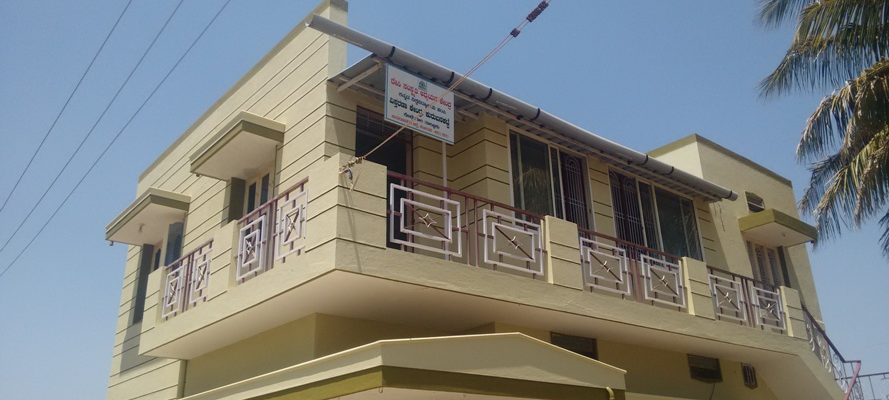satellite centers
Desi (Indigenes) Culture Study Centre , Kurubanaktte

INTRODUCTION
For the past two decades, the word desi has been used and its debate is being heard. Some scholars have studied Desi culture. And published books. Also, Prof. Aravinda Malagatti held a seminar on “Old Folk Consciousness and Desivada” (‘¥ÁæaãÀ d£À¥ÀzÀ ¥ÀæeÉÕ ªÀÄvÀÄÛ zÉùªÁzÀ’) in 1990-91. This is the first attempt by scholars to discuss Desi. Then there is much debate at the Universities level. After the Kannada University opened in Hampi, it expanded its reach as a discussion with new dimensions. Karnataka Sahitya Akademi, Kannada Sahitya Parishat, Karnataka Janapada Akademi also published books on Desi and Desivada. Which provides more opportunities for discussion and dialogue to discuss “Desi”. Desi has been continuously debating at Kannada University, Hampi for the last Twenty Five years. Some scholars have published books about Desi. The folklore Department runs an annual conference called Desi. Kannada University, Hampi has started the Desi Center for Culture Studies (Extension Center) in Chamarajanagar district. The center that has completed ten years needs to expand its Academic activities. It is necessary to create more reading and literature in that sense. So it is ready to publish a magazine called “Desi study”. It is intended to write research articles from scholars of various disciplines. And the magazine wants to give young writers the right opportunity.
In this context, Desi- Agricultural practice, Desi- Medicinal system, Desi-dress code is a good way of life. For that purpose, urban residents are moving towards the village seeking desi life. The Desi Culture Study needs to play a significant role in such transition. That is why the Kannada University, Hampi has set up an extension center at Kurubanakatte in Kollegal Taluk, Chamarajanagar, in the southern district of Karnataka, to encourage and sustain the culture of Desi.
Using local expert scholars as resource persons, it is aimed at promoting desi culture, writing books, organizing special lectures, and convincing modern generations of the best practices of the entire Desi culture. It is the main objective of the Desi culture study center.
Vision Statement of the Department
- Establishing indigenes (Desi) medicinal plants garden
- Developing indigenes (Desi) library:
- Developing indigenes (Desi) museum:
- Indigenes (Desi) news collect unit:
- Indigenes (Desi) cultural unit:
- Indigenes (Desi) study, research & training centre:
- Publishing of 100 books on indigenes (Desi) culture under “Desi Samskruthi Maale” Project.
Mission Statement of the Department
- Developing Desi medicinal plants garden, Launching Diploma and First Aid Certificate Courses on Desi Medicine. Making drugs available at the lowest prices for the public using the service of trained talented students and experts.
- Getting books from retired Professors, Principals, faculty and officials in the district. This will start Desi Library in zero capital. Providing Library access to local research students.
- Launching a Desi Museum by collecting old items from rural areas. Writing a drawing of rare items that are not available. Buying a suitable price for valuable materials the Museum has been developed to represent the Desi culture.
- Collection of old newspapers from local citizens free of cost. The most important thing to do is to copy and paste the contents of the sheet into the computer to allow researchers to use it as a source.
- The Center is conducting a state and National Cultural Conference once every 2 years.
- Using Directness of Local Content Experts. Guidance for students interested in education and research in accordance with the Center’s objectives workshop and training on handicrafts, Folk Art, and First Aid issues.
- The project has already been implemented to publish 60 books under the“Desi Samskruthi Maale”
Uniqueness of the Department
Generally the subjects studying at the University, such as Sociology, Anthropology, Economics, Geography, Linguistics, history etc, are limited to those matters. But Desi Culture Study conducts study in every aspect of Society.
Department Profile
Major Programs/Courses of the Department
Ph.D.
M.Phil.
Details of the faculties :
| Name | Designation | Highest Qualification | Specialization |
|---|---|---|---|
| Pro. Keshavan Prasad K | Professor | Ph.D. | Folklore, Tribal Studies Literature and Linguistics |
Conferences/ Seminars / Workshops/ Endowment Lectures etc. Organised by the Department.
Research Projects undertaken in the Department
| Name | Title of the Project | Funding Agency | Amount | Year | Completed / on Going |
|---|---|---|---|---|---|
| Prof.Keshavan Prasad.K Co-ordinator | Forest and Folklore in Karnataka (Group Project) | UGC/SAP/ DSP-III | 33,00,000/- | 2009-14 | Completed |
| Prof.Keshavan Prasad.K | Malai Madeshwara Epic: Cultural Glossary. (Malai Madeshwara Kavya: Samskrutika Padakosha) | Kannada University, Hampi | Not Claimed | 2013-15 | Completed |
Details of Publications, Books and Research Articles (with ISBN,ISSN and without ISBN, ISSN) :
Events :
Content Required from client
Photo Gallery
Image required from client
Contact Us
Dr. Venkatesh Indwadi
Desi Samskruthi Adhyayana Kendra
Kurubanakatte, Regional
Center, Kollegala, (Kannada V.V. Hampi)
Chamarajanagara.
Cell: +
E-Mail:
